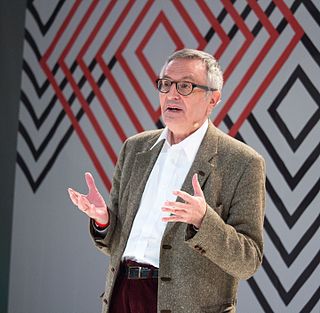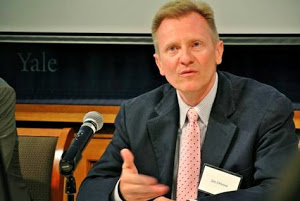
Friedrich August von Hayek, often referred to by his initials F. A. Hayek, was an Austrian-British academic who contributed to economics, political philosophy, psychology, and intellectual history. Hayek shared the 1974 Nobel Memorial Prize in Economic Sciences with Gunnar Myrdal for work on money and economic fluctuations, and the interdependence of economic, social and institutional phenomena. His account of how prices communicate information is widely regarded as an important contribution to economics that led to him receiving the prize.

Sir Karl Raimund Popper was an Austrian–British philosopher, academic and social commentator. One of the 20th century's most influential philosophers of science, Popper is known for his rejection of the classical inductivist views on the scientific method in favour of empirical falsification. According to Popper, a theory in the empirical sciences can never be proven, but it can be falsified, meaning that it can be scrutinised with decisive experiments. Popper was opposed to the classical justificationist account of knowledge, which he replaced with critical rationalism, namely "the first non-justificational philosophy of criticism in the history of philosophy".

Michael Polanyi was a Hungarian-British polymath, who made important theoretical contributions to physical chemistry, economics, and philosophy. He argued that positivism is a false account of knowing.
Catallactics is a theory of the way the free market system reaches exchange ratios and prices. It aims to analyse all actions based on monetary calculation and trace the formation of prices back to the point where an agent makes his or her choices. It explains prices as they are, rather than as they "should" be. The laws of catallactics are not value judgments, but aim to be exact, empirical, and of universal validity. It was used extensively by the Austrian School economist Ludwig von Mises.

Bernard Mandeville, or Bernard de Mandeville, was an Anglo-Dutch philosopher, political economist, satirist, writer and physician. Born in Rotterdam, he lived most of his life in England and used English for most of his published works. He became famous for The Fable of the Bees.
Spontaneous order, also named self-organization in the hard sciences, is the spontaneous emergence of order out of seeming chaos. The term "self-organization" is more often used for physical changes and biological processes, while "spontaneous order" is typically used to describe the emergence of various kinds of social orders in human social networks from the behavior of a combination of self-interested individuals who are not intentionally trying to create order through planning. Proposed examples of systems which evolved through spontaneous order or self-organization include the evolution of life on Earth, language, crystal structure, the Internet, Wikipedia, and free market economy.

John Nicholas Gray is an English political philosopher and author with interests in analytic philosophy, the history of ideas, and philosophical pessimism. He retired in 2008 as School Professor of European Thought at the London School of Economics and Political Science. Gray contributes regularly to The Guardian, The Times Literary Supplement and the New Statesman, where he is the lead book reviewer. He is an atheist.

William Warren Bartley III, known as W. W. Bartley III, was an American philosopher specializing in 20th century philosophy, language and logic, and the Vienna Circle.
Discourse ethics refers to a type of argument that attempts to establish normative or ethical truths by examining the presuppositions of discourse. The ethical theory originated with German philosophers Jürgen Habermas and Karl-Otto Apel, and variations have been used by Frank Van Dun and Habermas' student Hans-Hermann Hoppe.

Positivism is a philosophical school that holds that all genuine knowledge is either true by definition or positive –meaning a posteriori facts derived by reason and logic from sensory experience. Other ways of knowing, such as intuition, introspection, or religious faith, are rejected or considered meaningless.

James R. Otteson is an American philosopher and political economist. He is the John T. Ryan Jr. Professor of Business Ethics at the University of Notre Dame. Formerly, he was the Thomas W. Smith Presidential Chair in Business Ethics, Professor of Economics, and executive director of the Eudaimonia Institute at Wake Forest University. He is also a Senior Scholar at The Fund for American Studies in Washington, D.C., a Research Professor in the Center for the Philosophy of Freedom and in the Philosophy Department at the University of Arizona, a Visitor of Ralston College, a Research Fellow for the Independent Institute in California, a director of Ethics and Economics Education of New England, and a Senior Scholar at the Fraser Institute. He has taught previously at Yeshiva University, New York University, Georgetown University, and the University of Alabama.
Boundary-work is part of science studies. In boundary-work, boundaries, demarcations, or other divisions between fields of knowledge are created, advocated, attacked, or reinforced. Such delineations often have high stakes for the participants, and carry the implication that such boundaries are flexible and socially constructed.
Peter Joseph Boettke is an American economist of the Austrian school. He is currently a professor of economics and philosophy at George Mason University; the BB&T Professor for the Study of Capitalism, vice president for research, and director of the F.A. Hayek Program for Advanced Study in Philosophy, Politics, and Economics at the Mercatus Center at George Mason University.
Jeremy Jennings is an English political theorist and professor of political theory at King's College London. He is predominantly interested in the history of political thought, often with specific reference to France. He has authored a number of books on political topics, including the works of Georges Sorel, syndicalism and socialism. He became the founding editor of the European Journal of Political Theory. His other interests include political ideology and contemporary political theory. Jennings has been employed by the universities of Swansea and then Birmingham.
The following events related to sociology occurred in the 1970s.

John William Nevill Watkins was an English philosopher, a professor at the London School of Economics from 1966 until his retirement in 1989 and a prominent proponent of critical rationalism.
Ronald Hamowy was a Canadian academic, known primarily for his contributions to political and social academic fields. At the time of his death, he was professor emeritus of intellectual history at the University of Alberta in Edmonton, Canada. Hamowy was closely associated with the political ideology of libertarianism and his writings and scholarship place particular emphasis on individual liberty and the limits of state action in a free society. He is associated with a number of prominent American libertarian organizations.
Mario J. Rizzo is an American economist of the Austrian School. He serves as Professor of Economics at New York University.
The Kuhn-Popper debate was a debate surrounding research methods and the advancement of scientific knowledge. In 1965, at the University of London's International Colloquium in the Philosophy of Science, Thomas Kuhn and Karl Popper engaged in a debate that circled around three main areas of disagreement. These areas included the concept of a scientific method, the specific behaviors and practices of scientists, and the differentiation between scientific knowledge and other forms of knowledge.








